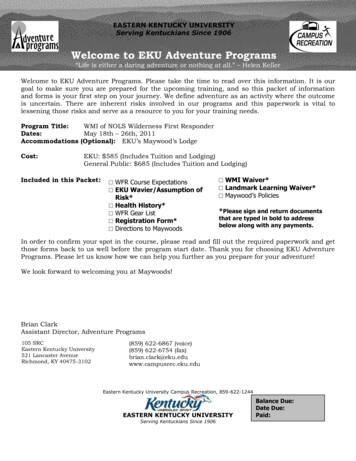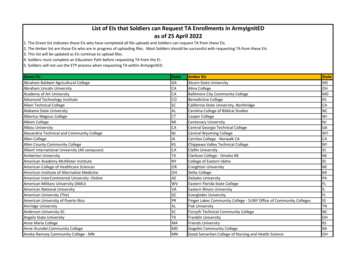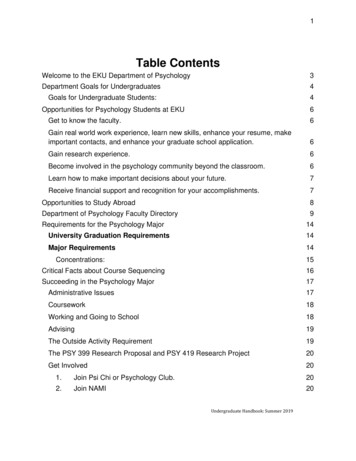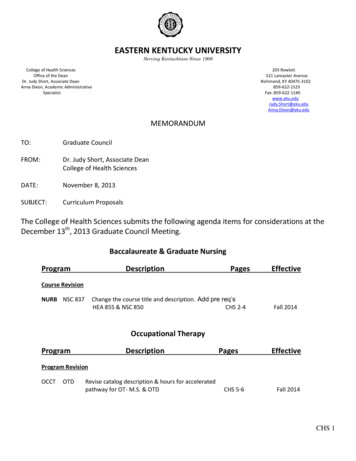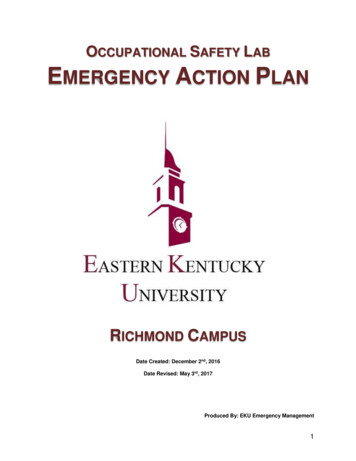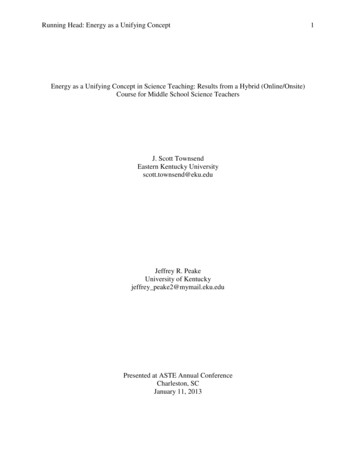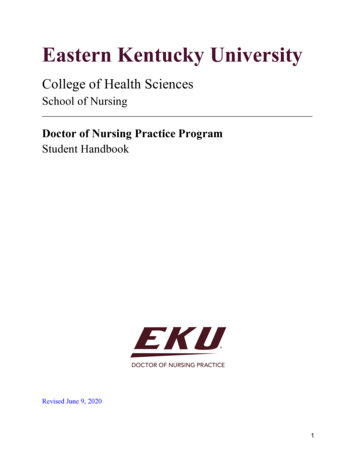
Transcription
Eastern Kentucky UniversityCollege of Health SciencesSchool of NursingDoctor of Nursing Practice ProgramStudent HandbookRevised June 9, 20201
ContentsIntroduction . 6Department of Baccalaureate and Graduate Nursing. Error! Bookmark not defined.Preamble . 6Mission Statement . 7Philosophy . 7Patient . 7Environment . 7Health. 8Nursing . 8Baccalaureate Nursing Education . 8Graduate Nursing Education . 8Doctor of Nursing Practice (DNP) Program . 9DNP Goal Statement . 9DNP Program Outcomes . 10Graduates of the DNP program will be able to: . 10Professional Standards for the DNP Program . 10The AACN DNP Essentials (2006): . 11Admission Information for the DNP Program . 11Admission Requirements . 11Graduate School Application Process . 12Deadlines for Application Submission. 12Selection of Applicants for Admission . 12Transfer of Credit from Outside Doctoral Programs . 13Student Services. 13Class Offerings . 13Bookstore Services . 13Library Assistance and Services . 13Information Technology Services . 14Email. 14Helpdesk . 142
EKU Direct . 14Advising and Registration . 14DNP Courses . 15Required Course Credits and Course Descriptions . 15DNP Curriculum Plans . 17Fall A Start Plan: 7 semesters . 17Fall B Start Plan: 7 and 1/2 Semesters . 18Spring A Start Plan: 7 semesters . 18Summer I Start Plan: 8 semesters . 19DNP Project Team . 19Professional Liability Insurance . 21EKU Student Photo ID . 21Latex Sensitivity/Allergy Policy. 22DNP Completion, Progression, Readmission, Withdrawal, and Reinstatement Policies . 23Academic Integrity Policy . 23Preamble . 23Academic Honesty Defined. 23Time Limit for Completion . 23Meeting the Graduate School and Department Requirements . 23Grading . 24DNP Program Progression, Readmission, and Reinstatement Policy . 24DNP Admission, Progression/Readmission/Reinstatement Committee . 24Purpose . 24Committee Composition . 25Meeting of Committee . 25Student Notification . 25Appeal of Decision . 25Withdrawal from the University . 25Withdrawal from the DNP Program . 26Delayed Enrollment in the DNP Program . 26Student Complaints and Appeals . 263
Social Media Policy . 284
Supporting Forms/Documents Available in the DNP Commons:Directory of Key Support StaffEKU DNP Project Idea Development ToolRequest for DNP Experience Site ApprovalDNP Experience LogDNP Progression/Readmission/Reinstatement Application5
IntroductionThis Student Handbook is intended for students entering Eastern Kentucky Universitys’ (EKU),Doctor of Nursing Practice (DNP) Program. The EKU DNP Program is a post-masters in nursing(Post-MSN) program. The DNP Student Handbook is not intended to replace the GraduateCatalog or the University Handbook for Students, but is provided for informational purposes toassist DNP students entering, progressing through, and completing the DNP program. Studentsshould consult with the DNP Faculty, DNP Coordinator, or Department Chair to obtaininformation or answers to their particular questions, and/or clarify their particular circumstances.All statements in this DNP Student Handbook are announcements of present policy and aresubject to change without prior notice. Every effort is made to communicate changes withstudents in a timely, appropriate manner. Nothing contained in this publication is intended tocreate, nor shall be constructed as creating a contract, either expressed or implied, or guaranteefor any term for any specific procedures. The department reserves the right to make changes inits policies, procedures, hand book, academic curricula, informational and printed materials, andall other items whenever needed to fulfill and properly exercise its educational responsibilitiesand objectives in ensuring a quality educational program.School of NursingPreambleEastern Kentucky University’s Baccalaureate Nursing Program was organized in 1971. In thesame year, the Meditation Chapel was dedicated, and its influence can be seen in the B.S.N. pin.In 1975, the program became part of the newly established College of Allied Health andNursing. In 1995, the Master of Science in Nursing Program was approved and implemented.The department name was changed to Department of Baccalaureate and Graduate Nursing(DBGN). In 2020, the department was renamed to the School of Nursing. In 1999, the collegename was changed to College of Health Sciences (CHS).The beliefs of the faculty and students relevant to nursing and health care are set forth in thestatement of philosophy. The philosophy guides the educational program and learningenvironment. The philosophy mandates that faculty, students, and graduates adapt to thedynamics of nursing, health care systems, and society.The School of Nursing within the College of Health Sciences functions as an autonomouseducational unit deriving the broad outlines of its aims and functions from the core values of6
Eastern Kentucky University. The College of Health Sciences affirms the Universitys’ corevalues of intellectual ability, sense of community, diversity, stewardship of place, accountabilityand excellence (EKU, 2016). The foundations of professional nursing education are congruentwith the purposes of the University and College of Health Sciences. Graduate nursing educationbuilds on baccalaureate nursing education and reaffirms the core values of Eastern KentuckyUniversity and the College of Health Sciences.Eastern Kentucky University Bulletin, General CatalogRevised and Approved by Faculty Organization on September 25, 2016Updated June 9, 2020 to reflect School of NursingMission StatementThe mission of the EKU School of Nursing is to prepare professional nurses at all levels whowork in interprofessional environments to promote health and well-being for diverse populationsacross the Commonwealth, country, and world.PhilosophyConsistent with the core values of Eastern Kentucky University and the College of HealthSciences, the faculty of the School of Nursing embrace the following beliefs about patient,environment, health, nursing, professional nursing practice, baccalaureate nursing education, andgraduate nursing education.PatientPatients include individuals, families, groups, communities, and populations. Each patientis unique and merits respect, support, and dignity. Patients develop and adapt inrecognizable phases and patterns. Patients continually seek meaning and purpose.Through participation in life experiences, patients grow, assume responsibility, anddevelop across the lifespan. Patients are holistic beings integrating the biological,psychological, socio-cultural, and spiritual dimensions. The term “client” may be usedinterchangeably with “patient.”EnvironmentEnvironment is the aggregate of all objects, conditions, forces, and ideas that interactwith patients. The elements of the environment include the physical, biological, sociocultural, and organizational systems. A health promoting environment facilitatesmovement toward wellness.7
HealthHealth is the dynamic process between the patient and the environment. Optimal healthincludes biological, environmental, psychological, socio-cultural, spiritual, andorganizational influences. Health reflects a patients’ ability, willingness, and resources toengage the environment in a manner that maximizes wellness.NursingNursing is an autonomous and caring profession. Nursing is an art and science thatpromotes health through patient-centered care. While respecting patients’ rights to selfdetermination, nursing provides holistic care during health, illness, and death.Baccalaureate Nursing EducationPreparation for professional nursing requires liberal and professional baccalaureate education.Baccalaureate nursing education develops critical thinking, collaboration, and decision making.Baccalaureate graduates are prepared to function as providers of patient-centered care,designers/managers/coordinators of care, and are members of a profession who are proactive in achanging health care system. Baccalaureate graduates must be professional, responsible, andaccountable for evidence-based practice.Baccalaureate nursing education is a transformative process for students and faculty and is aprocess of reciprocal accountability and responsibility. Teaching is a cooperative, collaborativeventure. Students and faculty share responsibility for the integration of experience, knowledge,and skills. Faculty members serve as role models and facilitators. Graduates are prepared topersue lifelong learning, function in a variety of healthcare settings, and deliver models, as wellas specialize at the graduate level.Revision Approved on August 19, 2009Reviewed and Updated on February 05, 2010Graduate Nursing EducationPreparation for advanced nursing roles is obtained through graduate education in nursing.Graduate education in nursing further develops the intellectual skills of critical thinking,analytical inquiry, and problem solving which were initiated in baccalaureate nursing education.Building on the foundations laid by baccalaureate education, the faculty recognizes the need foradditional knowledge to prepare graduates for specialty practice and for advanced roles. The8
evaluation of theory and research in nursing and related fields is imperative for graduates toincorporate evidence-based practice into their advanced nursing roles. A higher level ofsynthesis, analysis, and application of advanced nursing knowledge is essential for performanceobtained through graduate education in nursing. The graduate develops professional conceptsand behaviors in order to function in an advanced role.Nurses prepared at the graduate level must collaborate with other health disciplines in providinginnovative health care delivery. They do so as full partners, sharing the responsibility fordelineating society’s health goals and developing health care policy. In addition, they function asadvocates for the health care consumer who has the right to health care, regardless of social classor ethnic background.The University’s rural geographic setting creates unique health care concerns. The online formatof the DNP program creates an educational opportunity open not only to nurses in Kentucky, butin many states. The faculty is committed to educating nurses from Kentucky and other states atthe graduate level who will contribute to the general health of the nation. The educationalprocess at the graduate level is collegial in nature and promotes independent, self-directedlearning and self-evaluation. Students are required to communicate the results of their discovery,analysis, and synthesis of knowledge both orally and in writing to prepare them for theirincreased responsibility in making contributions to the knowledge base of the discipline ofnursing. Graduate education stimulates the learner to a lifetime of personal and professionaldevelopment. As baccalaureate education serves as the foundation for professional nursingpractice and for graduate study in nursing, graduate education prepares the nurse for morespecialized and advanced roles in the profession. Graduate education prepares nurses to serve asadvanced practice nurses, to serve in roles requiring other types of advanced nursing knowledge,and to serve as leaders in the health care system.Doctor of Nursing Practice (DNP) ProgramDNP Goal StatementThe Doctor of Nursing Practice (DNP) Program at Eastern Kentucky University prepares nursesto innovate, lead change, and improve health outcomes for patients and populations. The EKUDNP degree is a practice-focused nursing doctorate, that prepares nurses for the highest levels ofpractice. Practice, as defined by the American Association of Colleges of Nursing (AACN,2004), may include, but is not limited to direct patient care, organizational leadership, policymaking, and other essential practice roles. The EKU program has a strong emphasis onorganizational leadership.9
DNP Program OutcomesGraduates of the DNP program will be able to: Develop, evaluate, translate, and integrate theory-based nursing andinterdisciplinary knowledge in new practice approaches to enhance health andhealth care delivery. Develop and evaluate principles of organizational and systems theory to provideleadership in improving health outcomes and promoting excellence in practice. Utilize analytic methods, information technology, and research methods to criticallyappraise evidence-based data to evaluate outcomes of practice, practice patterns, andhealth systems against national benchmarks, to improve health care outcomes. Assimilate and process aggregate data, using information systems, informatics andtechnology, as well as evaluation and assessment tools, current research and outcome data,to translate this knowledge to improve or transform patient and health care systems. Actively influence health policy that addresses health disparity, access, quality, andfinancing at institutional, local, state, federal, and international levels. Employ effective communication and interprofessional collaboration to design,implement, and evaluate individual and system level interventions to improve health andcreate change in health care delivery systems. Implement clinical prevention and population health activities to improve the healthof individuals and populations.Professional Standards for the DNP ProgramThe Essentials of Doctoral Education for Advanced Nursing Practice, published in 2006by the American Association of College of Nursing (AACN), has been adopted as theprofessional standard to guide the DNP curriculum. The document specifies thecurriculum content for the practice doctorate in nursing. EKU’s DNP Committee hasreviewed the curriculum carefully for consistency with these standards to ensure aquality DNP Program.The DNP Curriculum is conceptualized by the AACN DNP Essentials, which are thefoundational outcome competencies deemed essential for all graduates of a DNPprogram, regardless of specialty or functional focus.10
The AACN DNP Essentials (2006):Essential I: Scientific Underpinnings for PracticeEssential II: Organizational and Systems Leadership for Quality Improvementand Systems ThinkingEssential III: Clinical Scholarship and Analytic Methods for Evidence-BasedPracticeEssential IV: Information Systems/Technology and Patient Care Technology forthe Improvement and Transformation of Health CareEssential V: Health Care Policy for Advocacy in Health CareEssential VI: Interprofessional Collaboration for Improving Patient andPopulation Health OutcomesEssential VII: Clinical Prevention and Population Health for Improving theNation’s HealthEssential VIII: Advanced Nursing PracticeAdmission Information for the DNP ProgramIndividuals interested in applying to the DNP Program should first contact EKU EnrollmentAdvisor, Halie Sissle at 859-622-2517 or halie.sissle@eku.edu. Specific questions relatedspecifically to nursing, the DNP Experience/Clinical Hours, or other professional inquiries willbe forwarded to the DNP Program Coordinator, Dr. Molly J. Bradshaw, atmolly.bradshaw@eku.edu. Applicants may also email the DNP Coordinator directly to scheduleand appointment.Additional questions or concerns can be directed to:Eastern Kentucky University, Graduate SchoolPhone: 859- 622-1742Hours: Monday - Friday, 08:00am- 04:30pm ESTAdmission RequirementsMinimum requirements for admission to the DNP program include: MSN degree from a nationally accredited program11
Free and unrestricted R.N. license in the state of residence or nursing practice Graduate GPA of at least 3.0 (4.0 scale)Graduate School Application ProcessA student seeking admission to the Post-Masters DNP Program at Eastern KentuckyUniversity must apply online for admission to the Graduate School. The student is responsiblefor submitting completed materials to the Graduate School, including the Graduate SchoolApplication Form, transcripts of all previous college work (except for course work at EasternKentucky University), and the current application fee. Applications for the Graduate Schoolare available online from the Graduate School website.Please note that the narrative relating your goals for graduate study is a required part of theapplication process. This narrative should be considered a very important part of theapplication. Faculty will use this narrative to evaluate your written communication skills andthe relationship of your career goals to those of the program. The narrative essay shoulddescribe the relationship between the applicant’s professional goals and the DNP Program.The applicant must provide three professional references. The applicant will provide the emailaddresses and an electronic reference form will be emailed to each reference when theapplication is submitted. A variety of references is suggested to provide a more completepicture of potential for graduate study (i.e., peer, supervisor, and professor). References fromfamily members and friends are not considered professional in nature. Please informindividuals receiving electronic reference forms that your application file cannot be completeduntil the reference form is submitted to the EKU Graduate School.A completed application packet includes: A completed application form Resume or Curriculum Vitae Short narrative as instructed in the application (500-700 words) Three Professional referencesDeadlines for Application SubmissionApplication deadlines for the DNP program consistent with those published by the EKUGraduate School. Students are admitted for enrollment four times per year: Fall A (July 1)Fall B (August 15)Spring A (November 1)Summer I (March 15)Selection of Applicants for AdmissionCompleted application packets will be reviewed by members of the DNP Committee on12
an ongoing basis. Applicants will be admitted, denied, or asked to participate in a phoneor video conference interview. Enrollment in the Graduate School does not guaranteeeither admission or completion of the DNP Program. As a limited number of applicantsare accepted for admission, selection will be based on careful consideration of alladmission information and the degree to which each candidate meets the requirements.Only completed applications will be reviewed. Notification of acceptance will occur byemail.Transfer of Credit from Outside Doctoral ProgramsConsistent with the Graduate Catalog, an incoming student may transfer no more than 12hours into the EKU DNP Program. Students wishing to transfer credits will be requiredto submit official transcripts and course syllabi for review. Transfer of credit is at thediscretion of the DNP Committee and will be assessed on an individual basis todetermine the congruence of previous course work with NSC course outcomes.Student ServicesClass OfferingsClasses are offered through an on-line format with occasional synchronous classes utilizingweb video conferencing technology. No on-campus class meetings are required.Bookstore ServicesTextbooks and most course supplies may be purchased through the EKU OfficialBookstore (Barnes & Noble at EKU), located in the Powell Building on EKU Campus.Phone orders are not permitted, but students can best order books online using the EKUOfficial Bookstore website.Contact Information EKU Bookstores:Phone: (859) 622-2696Fax: (859) 622-2660E-mail: ekubooks@eku.eduLibrary Assistance and ServicesGeneral library services include access to over 292 databases, group and individual researchassistance, in-person and electronic reference assistant, discipline-specific subject guides(Nursing Library Guide), and assignment-based instruction via classroom or Blackboard.13
For reference assistance, DNP students should first contact the Nursing Library Liaison.Individual support can be provided in-person, live via conferencing technology, or by othermeans.EKU Nursing Library Liaison:Karen Gilbert, karen.gilbert@eku.eduAdditional online library support can be obtained from:EKU Libraries Distance & Online Education Program Office:Contact: Brad MarcumEmail: brad.marcum@eku.eduPhone: (859) 622-1801Website.Information Technology ServicesEmailEvery student registered with Eastern Kentucky University has access to a free EKU emailaddress. Students are expected to check their EKU email address on a regular basis since this isthe primary method of contact for online classes. Use this website to activate the EKU emailaccount: ur-student-e-mail-accountHelpdeskEKU’s ITDS Helpdesk serves as the first point of contact for all our computingneeds. Call (859) 622-3000 for support 24 hrs per day, 7 days per week.EKU DirectEKU Direct provides students with access to a variety of online servicesincluding but not limited to course schedules, managing EKU account passwords,and student financial information.Advising and RegistrationUpon admission, DNP students receive a gap analysis and curriculum plan (discussed in a latersection). Students are expected to follow the agreed upon plan for academic progression. The14
DNP Coordinator serves as the primary faculty advisor for enrollment and curriculumprogression.EKU DNP Coordinator:Dr. Molly J. Bradshaw DNP, APRN, FNP-BC, WHNP-BCEmail: molly.bradshaw@eku.eduAs students enter courses directly related to the DNP Project (NSC 994/NSC 938), the DNPProject Chair also contributes to the advising process as the expert of the status of the DNPProject. When the DNP Coordinator and DNP Project Chair are in agreement, the student willbe advised for registration via the EKU Enrollment Advisor. The EKU Enrollment Advisor,Halie Sissle, will assist students with the specific logistics of course enrollment.EKU Enrollment Advisor for the DNP Program:Halie SissleEmail: halie.sissle@eku.eduDNP CoursesRequired Course Credits and Course DescriptionsThe following is a summary of the required courses in the DNP Program, the credit hours foreach, and the course descriptions.NSC 905: Analytical Methods for Evidence Based Practice (3 credit hours)Description and analysis of quantitative data using statistical and graphical methods, forpurposes of evidence-based practice.NSC 940: Theoretical Application for DNP (3 credit hours)Analyze the development of knowledge and the interrelationship of theory, research,and practice. Theoretical perspectives and foundations for inquiry of nursing sciencewill be explored, emphasizing strategies for theory development, evaluation, andapplication.NSC 942: Informatics in Healthcare Delivery (3 credit hours)Focuses on theoretical basis of information systems in healthcare, impact of informaticson clinical practice and administrative decision-making, and strategies to evaluate andImprove use of information technology in healthcare.NSC 950: Health Policy (3 credit hours)Analysis of policy process in order to develop advanced nursing leadership skills for15
designing, implementing, and evaluating health policy.NSC 954: Healthcare Organizational Leadership (3 credit hours)Explores theoretical foundations of leadership with an organization systemsperspectives. Examine principles of organizational systems, quality improvement,dimensions of health/organizations, and human resources management.NSC 960: Healthcare Economics and Finance (3 credit hours)Examines healthcare economics and business practices and uses their relationships onhealth policy and clinical practice. Economic concepts and tools will be utilized toexamine issues and solve problems/issues pertaining to healthcare and the delivery ofhealthcare services.NSC 990: Synthesizing Evidence for the DNP (3 credit hours)Translate specific nursing knowledge into complex interventions to improve rural healthoutcomes.NSC 992: Implementation Methods for the DNP (3 credit hours)Translate specific multi-disciplinary knowledge into complex interventions to improverural health outcomes in the development of a proposal to enhance evidence-basedpractice.NSC 900: Seminar I: DNP Role Transition (1-3 credit hours)Explores issues perti
Doctor of Nursing Practice (DNP) Program DNP Goal Statement The Doctor of Nursing Practice (DNP) Program at Eastern Kentucky University prepares nurses to innovate, lead change, and improve health outcomes for patients and populations. The EKU DNP degree is a practice-focused nursing doctorate, that prepares nurses for the highest levels of


